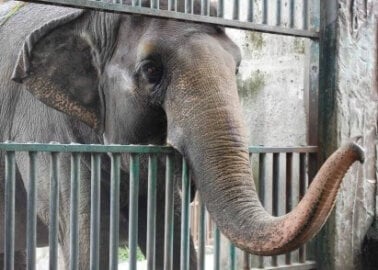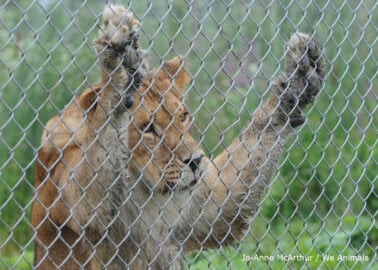Inky’s Great Escape Shows Us Why Octopuses Don’t Belong in Aquariums
The story of Inky, a male octopus who ingeniously managed to escape from New Zealand’s National Aquarium, has captured the Internet’s imagination this week.
Inky the octopus and other great escapes
Inky the octopus made a dash for freedom this week, by apparently breaking out of his tank and slithering down a 50-metre drainpipe. But we should not be surprised – octopuses can squeeze through tiny spaces.
Posted by The Guardian on Wednesday, April 13, 2016
When the lid of his tank was left slightly ajar one night, Inky didn’t waste any time in making a beeline for the exit. The next morning, aquarium staff were puzzled to find just one, rather than two, octopuses in the tank and mysterious tracks across the floor of the room. They concluded that he must have clambered to the top of his enclosure, slid down the side of the tank and slithered 4 metres across the aquarium floor to squeeze himself into a 50-metre drainpipe that led to the sea – and freedom.
This story illustrates octopuses’ well-documented cleverness. The leggy cephalopods have unique personalities and problem-solving abilities, and they have been described as being “the first intelligent beings on the planet”. There are numerous stories of how they’ve caused havoc in aquaria by unscrewing water pipes, short-circuiting the lights and even sneaking fish from neighbouring tanks.
However, Inky also shows us something that should be obvious: animals don’t want to be held captive. Inky was born in the ocean and ended up in the aquarium after he was caught in a fisherman’s cray pot. After being taken from the rich, complex environment of the sea and stuck in a small glass tank, with nowhere to hide from bright lights or gawping human visitors, it’s no wonder that he seized the chance to escape and return to his ocean home.
Aquaria often keep octopuses and other sea animals in almost empty tanks so that visitors can get a better look at them. The lack of stimulation can cause these intelligent beings distress and frustration, as they are denied the opportunity to exercise natural behaviour such as taking shelter under rocks and plants. A study found that animals at 90 per cent of UK aquaria showed stereotypic behaviour as a result of being kept in captivity.
Please help animals like Inky by refusing to visit aquaria and zoos that imprison animals for human entertainment. Instead, learn about sea animals’ fascinating lives by watching nature documentaries or trying out an innovative, immersive virtual reality experience.



